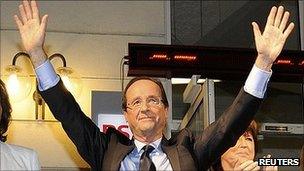Testing times for Europe's left as Hollande steps out
- Published
- comments

Francois Hollande is a career politician with no administrative experience
In France the left sniff power. They believe this is their moment. They have settled on a candidate to challenge President Nicolas Sarkozy in next year's presidential election.
They last tasted victory when Francois Mitterrand eased his way into the Elysee Palace. Now the polls suggest the public is weary of President Sarkozy, the flash, the bling, the hyperactivity, the suspicion of corruption, the muscling of opponents.
Francois Hollande, 57, will be the standard-bearer for the Socialists. They ran a primary campaign that attracted more than two million voters and he emerged the winner.
He is a career politician with no administrative experience. He is regarded as moderate, soft-left, solid and unexciting. He rides a scooter to work. His critics say he has not had an idea in 10 years.
His former partner seemed to agree when she said he had achieved nothing in 30 years. Mr Sarkozy clearly relishes the fight. He judges his main opponent to be a paper tiger, a sugar cube that looks solid but dissolves rapidly.
But this should be the left's time. International capitalism is in the dock. Many of the banks' debts have ended up in the public accounts and across Europe the taxpayers have picked up the bill.
Workers are losing their jobs to pay for the bankers' mistakes. Bankers are widely perceived as greedy and dangerous risk-takers. The left say the international financial system has failed a new generation with millions of Europe's young people without jobs.
The left are also having their Tea Party moment with the Occupy Wall Street protests. There is anger to be tapped into and exploited by a Socialist candidate.
'Soak the rich'
From a distance the contest is shaping up to be a classic left-right fight. Mr Hollande will be tough on the rich and the banks: banks that run into trouble should be rescued not by the taxpayer but by other banks. He has promised 60,000 more teachers. He will paint the president as inhabiting a gilded world with rich friends.
The left in France will want some red meat. Mr Hollande's rival to become the Socialist candidate was Martine Aubry. She ran an unashamedly "soak the rich" campaign. She wanted a 50% tax on those earning £85,000 or more.
President Sarkozy's weakness is that he promised to shake up France and to make it more competitive and dynamic. He has pushed through some reforms like raising the retirement age but unemployment has remained stubbornly high and growth is anaemic. He will argue that the left's plan is to send France back to the future, even bringing the retirement age back down to 60 while every other country is Europe is raising its pension age.
But there is a bigger challenge for the left. Apart from in Denmark, they have failed to take advantage of the global recession and the debt crisis. Their critics ask how they will deliver jobs, growth, and reduce the debts. How will the new public sector jobs be financed? So far they have struggled to find an answer.
The criticism of Labour in the UK was that it came to be regarded as the party of the public sector, of high spending and immigration. Much of the extra spending that went into the public sector ended up inflating the salaries of management.
Plan for growth
The left in France may triumph through the unpopularity of Sarkozy alone. But they would be unwise to depend on it. He is a tough campaigner and at his best in a crisis.
The test for the Socialists will be to articulate a plan for growth and jobs. In conversation after conversation in cities across Europe, I have spoken to young people who are now looking to the "New World", to Canada and Australia, for a future.
The "Old World" with its heavy-handed regulation, its bureaucracy, its desire to harmonise, to plan centrally, faces a historic challenge as to whether it can compete with an emerging world where the prizes go to the nimble, the flexible, the innovators.
One of the biggest questions for all candidates will be whether France and indeed Europe can afford the costs of its welfare states.
The French elections promise to be a fierce, no-holds-barred contest between left and right at a crucial moment for Europe and the global economy.